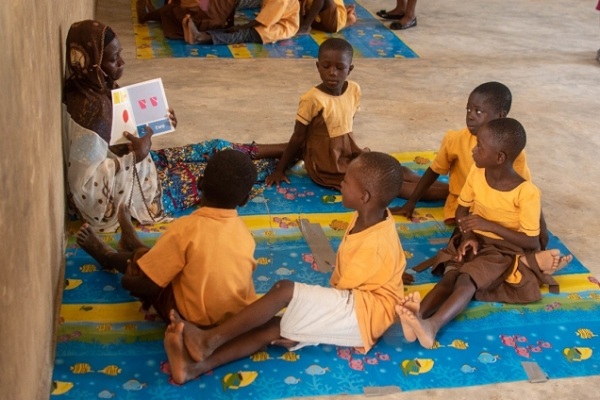The Ghana Education Service (GES) has announced plans to scale up the innovative GES-Lively Minds kindergarten programme across all 16 regions of the country, targeting every public kindergarten school.
The nationwide expansion follows the programme’s success in 64 districts across eight regions in northern Ghana, where it had significantly improved school enrolment, boosted retention, and enhanced children’s cognitive, emotional, and physical development.
Funded by a consortium of international partners comprising USAID, UNICEF, Global Innovation Fund, Grand Challenges Canada, the French Innovation Fund, and ELMA Philanthropies, the programme is implemented with technical support from Lively Minds, a UK-based non-governmental organisation specialising in early childhood development.
Since its inception, the programme has reached more than 3,500 schools and impacted over 290,000 children, combining play-based learning with parental engagement to enhance both school and home learning environments.
The initiative operates on three main pillars - Play Schemes run by trained mothers, Monthly Parenting Courses, and Active involvement of Kindergarten Teachers.
Mothers are trained to lead small groups of children in educational games, storytelling, and physical play while teachers oversee the sessions and deliver parenting workshops aimed at improving home-based care and nutrition.
During a recent monitoring visit to beneficiary communities in the Upper East Region, Ms Adisa Tassa, National Director of Early Childhood Education, GES, announced the upcoming national rollout of the programme.
“We’ve seen remarkable success in the north, significant enrolment, better learning outcomes, and more parental involvement,” she said. “With continued technical support from Lively Minds, we are confident this can be replicated nationwide.”
She noted that countries such as Ethiopia, Burundi, Uganda, and The Gambia were studying Ghana’s model as a reference for improving early childhood education in their own systems.
A national study revealed that only 13 per cent of Ghanaian parents engage in early learning play with their children, an alarming gap that the programme aims to close.
“We train mothers to lead play sessions for children aged three to six using fun, interactive games. This bridges the gap between homes and schools and supports holistic child development,” Ms Tassa
At Azudoone Primary School in the Kassena-Nankana West District, Mr Akubase Dominic, Headteacher of the school, reported a dramatic rise in enrolment and academic performance since the programme's introduction.
“Kindergarten enrolment was previously low and retention was a major problem,” he said, adding, “Now, children stay in school and excel, especially those who have gone through the play schemes.”
Mothers involved in the programme shared how it had transformed their parenting and revived traditional games that fostered learning.
Madam Lydia Adogbire praised the cultural relevance of the activities, while Mrs Apala Hammedu noted she had learned time management and how to prepare nutritious meals for her children.
Mr James Adongo Awini, Director of Programme Delivery for Lively Minds in Ghana and Uganda, highlighted that the programme’s design was rooted in years of testing and research.
Piloted between 2017 and 2019, the initiative underwent a Randomised Controlled Trial led by the Institute for Fiscal Studies (UK) and Innovations for Poverty Action (IPA Ghana), which found that children in the programme achieved learning gains equivalent to an extra year of schooling.
Following those results, the Ministry of Education fully adopted the programme in 2019 for implementation across Upper West, Upper East, North East, Northern, Savannah, Bono, Bono East, and Oti regions and in 2021, a partnership agreement between GES and Lively Minds was reached for national scale-up.
Mr Awini emphasised that the model is “cost-effective, sustainable, and fully embedded within GES structures,” utilising local kindergarten teachers, district education officers, and regional directors for delivery and accountability.
Ms Alison Naftalin, Lively Minds CEO, praised the programme’s impact and encouraged continued parental involvement, stressing that “quality early childhood development is achievable in rural areas when parents, especially mothers, are actively involved.”
Currently, districts in the Upper East Region benefiting from the programme include Builsa North and South, Kassena-Nankana West, Talensi, Bolgatanga East, Bawku West, Binduri, Garu, and Tempane.
GNA





